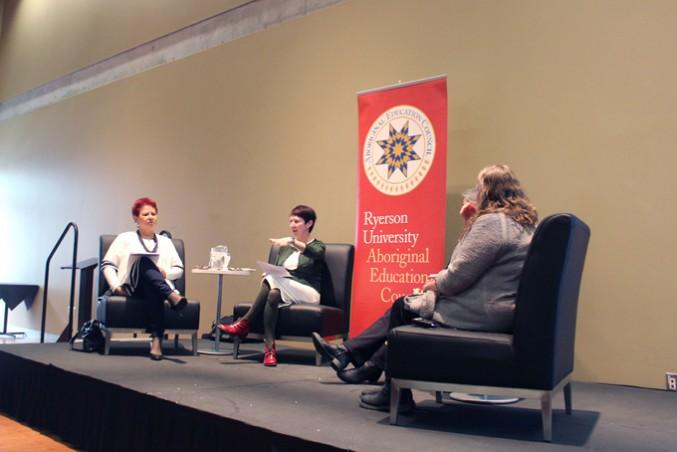By Sarah Krichel
The audience heard the phrase over and over; “being comfortable with discomfort.” This is essential in aboriginal activism, said Darrell Bowden, coordinator of Ryerson’s Office of Equity, Diversity and Inclusion (EDI).
Joanne Dallaire, Elder and Traditional Counsellor for Ryerson Aboriginal Student Services (RASS) said that the federal government is insufficient in their efforts to help the aboriginal community — but that Ryerson University has done great things and is on its way to doing more.
To get there, Ryerson hosted a discussion in collaboration with the Truth and Reconciliation Commission (TRC) to create a forum about how to implement more aboriginal education into academic institutions.
“This is something we need to talk about,” said Bowden. “We need to look at the way in which we’re teaching and working with students of all faculties and disciplines across our campus.”
“How do we infuse even gently aboriginal knowledge, or even gently inclusion strategies?” said Bowden.
He said the ultimate goal of these discussions is to create conversation and ideas that will infuse aboriginal knowledge into our academic plan.
Kimberly Murray, assistant deputy attorney general in the Aboriginal Justice Division, said that universities have the power to help implement the calls to action related to education from the TRC.
“Reconciliation is about our relationship. Reconciliation is about how we talk to each other and about each other,” she said.
“Universities need to work with corporations, need to work with government, need to work with communities, need to work with citizens,” said Murray. “And I would really like to see the universities open [their] doors to the community. Let’s make sure no one graduates from Ryerson without taking courses on Indigenous history.”
In addition to discussions, Ryerson’s interim president Mohamed Lachemi appointed Dallaire along with Denise O’Neil Green, assistant vice president and vice provost for EDI, to do a consultation about how to start working on implementing the strategies and the calls to action into Ryerson.
Dallaire said she hopes to have aboriginal education implemented into curriculums by next September, but she is willing to keep going for as long as it takes.
“Right now we’re gathering information,” said Dallaire. “We’re going to be collecting information from various people who have already been meeting on the campus. “Putting out surveys, having town halls within Ryerson, then extending that to the community, and then compiling that information.”
Bowden said that Ryerson needs to provide the opportunity of being able to engage somebody where they actually see themselves in the material.
“It’s not centering someone out and tokenizing an individual saying, ‘Oh, you understand this aboriginal stuff. Tell me about your side,’ which we still see happening on our campus.”
“So we’re really starting to look at how do you work with folks in spaces and building us into what’s currently happening,” said Bowden.
These events hosted by Ryerson and contributed to by associations such as the TRC, EDI and the Indigenous Students’ Association, are put together so people can discuss how to bring messages of equity and inclusion into learning spaces, said Bowden and that it’s not about changing everything in the curriculum.
“It could just be looking at the ways you’re doing things and recognizing how you can be more inclusive,” he said. “How can you make the environment fit the individual, not the individual fit the environment. That’s our method.”










Leave a Reply